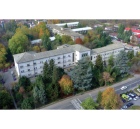Belimo Energy Valve reveals energy savings

Utilising Belimo’s Energy Valve to control, monitor and meter the fuel used for space heating at the Institute of Forestry at the University of Macedonia has reduced heating costs by around 30%. The savings were confirmed by invoices from the local heating supplier Balkan Energy Group.
The approach was to reduce the nominal room temperature from 21°C to 16°C after 3 p.m. and at weekends. The trial extended from early February to the end of April.
The Energy Valve measures, regulates, balances and saves all measurements. An integrated web server enables the data to be viewed and analysed for a period of 13 months through any Internet connection with Belimo’s Energy Valve tool.
The 2-way valve that was previously used in the primary part of the heat-supply facility was replaced with a DN65 Energy Valve. The valve was controlled with a room controller having a PI response.
The Energy Valve uses sensors to continuously measure, balance and control the flow and temperature in the flow and return.
The transparent energy monitoring made it possible to analyse where and how much energy was being used in the heating system. The potential for optimisation was quickly determined.







